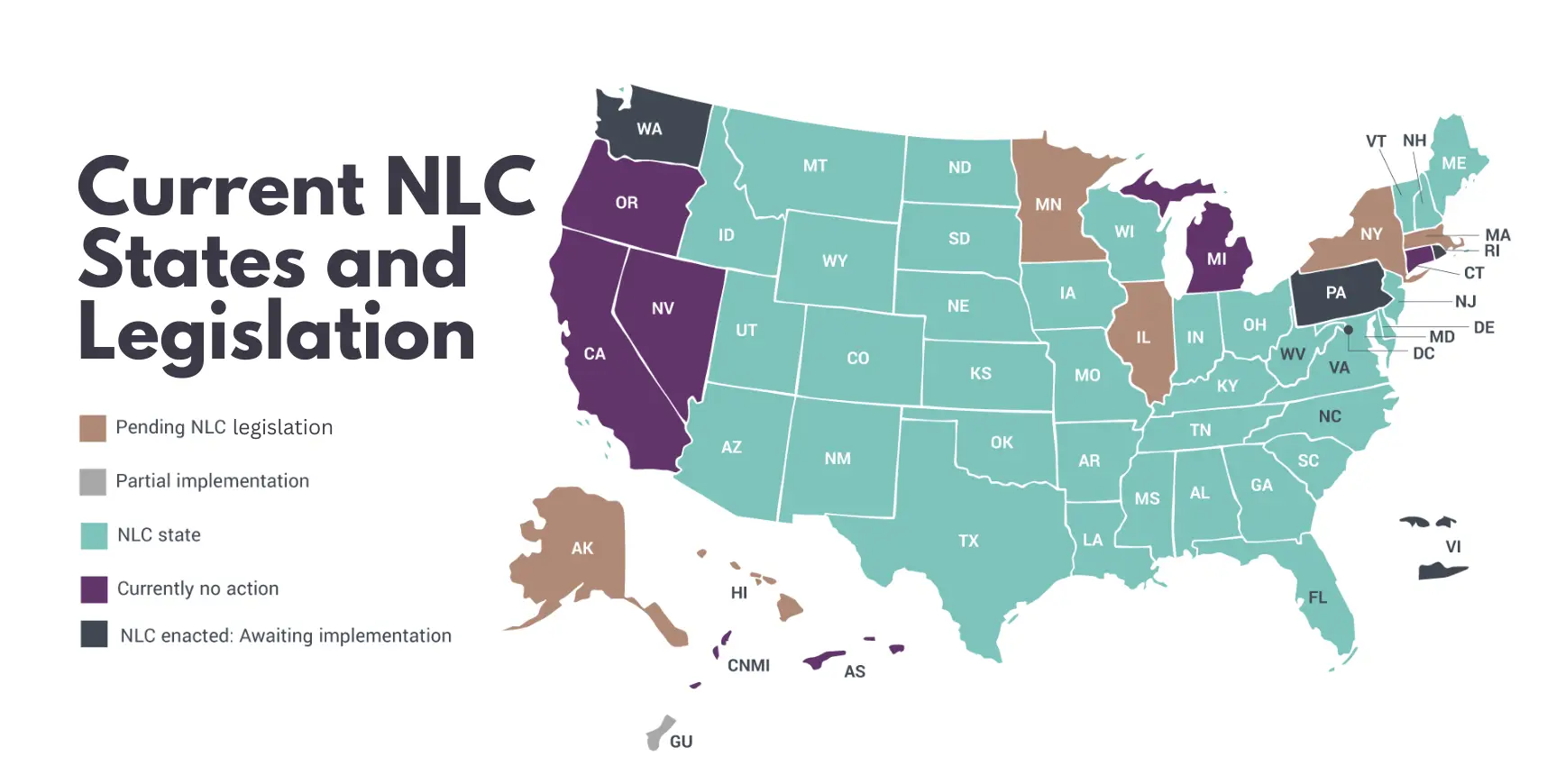Nurse License Compact
Janette Wilkinson MSN, PMHNP
Psychiatric Mental Health Nurse Practioner
Willamette Health & Wellness in Portland, OR
The Nurse Licensure Compact is a multi-state licensure model that allows nurses to practice across 41 U.S. states and territories without obtaining additional, state-specific licenses. While discussion around participation in the NLC has been ongoing, as of 2023, Oregon is not part of the compact agreement. Both sides of the conversation offer valid arguments in support of and against the NLC.
To help further the discussion, the Oregon Center for Nursing (OCN) has compiled bipartisan resources to help groups on both sides become more educated on the NLC and its potential impact on the state’s nursing workforce. These resources were designed in collaboration with an independent volunteer task force hosted by OCN in 2023.

Common Asked Questions in Oregon about the NLC
The primary aim of the NLC (Nurse Licensure Compact) is to enhance the mobility of the nursing workforce and to enhance states' access to nursing care by removing geographical practice limitations between jurisdictions with analogous licensing requirements and nursing regulations. In the absence of the NLC, nurses are required to obtain licensure for each jurisdiction where their patients are located. For nurses whose responsibilities involve crossing geographical or virtual boundaries (e.g., telehealth) to provide care, they must possess a separate state license for each jurisdiction where they practice. Under the NLC, an eligible nurse with a primary residential address in an NLC member jurisdiction and possessing a multistate license can practice in all NLC states using a single license. The rationality of the NLC is founded on the fact that the requirements for RN licensure and the scope of RN practice are remarkably similar among jurisdictions with Boards of Nursing (BONs) that are affiliated with the National Council of State Boards of Nursing (NCSBN).
According to the NCSBN, the NLC allows for nurses to have one multistate license with the ability to legally practice in all compact states/territories.
- Enabling nurses to practice in-person or provide telenursing services to patients located across the country without having to obtain additional licenses.
- Allowing nurses to quickly cross state borders and provide vital services in the event of a disaster.
- Facilitating telenursing and online nursing education.
- Making practicing across state borders affordable and convenient.
Oregon employers report a desire to participate in the NLC to:
- Quickly onboard staff. In October 2023, the OSBN reported the average processing time for an RN license is approximately 30 days from receipt of a complete application (Self-Reported by OSBN).
- Reduce the cost of licenses for employees who need to practice in multiple states.
Sources: “Take Action.” NURSECOMPACT, https://www.nursecompact.com/take-action.page. Accessed 2 Nov. 2023.
Oregon must pass legislation authorizing participation in the NLC because there will be changes to Oregon’s Nurse Practice Act.
Upon a state's successful passage of legislation enabling its participation in the NLC, the Oregon State Board of Nursing (OSBN) will be responsible for executing various operational adjustments, including, but not limited to:
- Formulating a fee structure to accommodate both single-state and multistate licenses.
- Modifying the licensing application process to incorporate a multistate licensure option.
- Providing training for staff to evaluate applicants' eligibility for multistate licensure.
- Crafting strategies for conducting inquiries into instances of unprofessional conduct by nurses, facilitating the exchange of information with other jurisdictions, and enforcing appropriate sanctions on a nurse's practice privileges.
Source: National Council of State Boards of Nursing. Nurse Licensure Compact Model Language, 2015. https://www.nursecompact.com/files/NLC_Final_050415.pdf. Accessed 2 Nov. 2023.
Once implemented, Oregon will report to the Interstate Commission of Nurse Licensure Compact Administrators, a group of representatives of all NLC participating states, and pay a $6,000 annual membership fee. Nurses practicing under a multi-state compact licensure obtain their license in their home state or state of primary residence. If Oregon joins the NLC, nurses practicing in Oregon from other states will not pay a separate license fee to practice in Oregon.
Source: Nurse Licensure Compacts before, during, and after COVID.” Brookings, https://www.brookings.edu/articles/nurse-licensure-compacts-before-during-and-after-covid/. Accessed 2 Nov. 2023.
The exact number of nurses that the Nurse Licensure Compact (NLC) will bring to Oregon is unknown. Various studies offer differing insights into the potential impact. Some studies suggest that participation in the NLC can increase nurse mobility between NLC states by approximately 11 percent.
However, it's important to note that other studies have demonstrated that there may be no significant movement of nurses when the NLC is adopted. The actual outcome will depend on numerous factors, including the specific dynamics of Oregon's healthcare labor market, the preferences of nurses, and other contextual variables. Therefore, while the NLC has the potential to enhance nurse mobility, the precise number of nurses it will attract to Oregon remains uncertain.
Source: Shakya, Shishir, et al. “Nurse Licensure Compact and Mobility.” Journal of Labor Research, vol. 43, no. 2, 2022, pp. 260–74, https://doi.org/10.1007/s12122-022-09333-2. Source: DePasquale, C., & Stange, K. (2016). Labor supply effects of occupational regulation: Evidence from the nurse licensure compact (No. w22344). Cambridge, MA: National Bureau of Economic Research.
There is no difference. The terms “compact license” and “multi-state license” are used interchangeably to refer to a Nurse Licensure Compact (NLC) license.
Source: Multistate License | WA Board of Nursing. https://nursing.wa.gov/licensing/multistate-license. Accessed 2 Nov. 2023
Nurses who are employed in the Federal, Veterans Administration, Military, and Indian Health Services sectors are not required to obtain a license in the state where they practice as long as they possess an active nurse license from another state. However, this exemption does not apply when a nurse is working in a civilian facility. In such cases, the nurse must obtain the appropriate licensure in the state where they are practicing.
In addition, military spouses working as nurses have the flexibility to choose or change their primary state of residency. If a military spouse working as a nurse maintains their legal residency in a state that is part of the Nurse Licensure Compact (NLC) and holds a multistate license, but their military family is stationed in another NLC state or territory, that nurse can work under their home state's multistate license. This does not require the military spouse to acquire an additional license in the new state.
This question has not been directly addressed by the NCSBN. According to the National Law Review:
“States, such as Texas, allow a state licensing agency to revoke the license of a physician who performs an abortion and has articulated broad jurisdiction over conduct that may be criminally prosecuted in the state. These types of state laws could criminalize licensees or other individuals who assist a patient in obtaining an abortion in a state where abortion is legal. It is possible that state licensing agencies where abortion is illegal could pursue disciplinary action against a provider who is licensed in multiple states if that provider performs a legal abortion in another state.”
Only the state where a nurse got their multistate license (“home state”) can officially punish the nurse's license if they do something wrong. There are guidelines for what to do if the nurse acts unprofessionally both in their home state and the other state. However, there are currently no guidelines for if a nurse participates in a health procedure that is legal in the nurse’s remote state but not the home state.
Source: What Abortion Providers Should Consider After Dobbs Ruling. https://www.natlawreview.com/article/three-considerations-health-care-providers-after-dobbs-decision. Accessed 2 Nov. 2023.
Source: Boehning, Annie P., and Lisa M. Haddad. “Nursing Practice Act.” StatPearls, StatPearls Publishing, 2023, http://www.ncbi.nlm.nih.gov/books/NBK559012/.
Certainly, there are alternative approaches that Oregon could consider in addition to the Nurse Licensure Compact (NLC) to address the regulation of nursing practice for both in-state and out-of-state nurses. One existing alternative within Oregon's current framework is the provision of a 90-day Nurse Licensure Exception, particularly for situations such as temporary staffing shortages. This exception enables nurses from other states to provide care to Oregon residents in an expedited way, although it may only cover some scenarios and settings. However, it's important to note that for Oregon nurses seeking to offer their services to residents of other NLC states, the primary alternative would involve obtaining single-state licenses for each state where those residents reside. While this is an option, it can result in increased costs and administrative paperwork for individual nurses.
Source: Section 678.031 – Application of ORS 678.010 to 678.410, ORS § 678.031 | Casetext Search + Citator. https://casetext.com/statute/oregon-revised-statutes/title-52-occupations-and-professions/chapter-678-nurses-long-term-care-administrators/professional-nurses/generally/section-678031-application-of-ors-678010-to-678410. Accessed 2 Nov. 2023.
Any nurse interested in advocating for Oregon to become an NLC state can contact their legislator. If you aren't sure who your legislator is, you can look it up here.
No. If you are a nurse licensed in Oregon and you need to treat patients outside of the state, you will need to obtain a license for that state where you are treating patients. Oregon's status as a compact state does not impact your ability to practice outside of the state, but does require you to hold individual licenses in the state(s) you will be working. This might require additional application fees, etc.
Additional Resources
Submit Your NLC Questions
What questions do you have about the Nurse Licensure Compact and how it can impact or serve nursing professions in Oregon? Submit your question(s) using the form on this page. OCN will incorporate all applicable community-submitted questions into a future version of our FAQ documentation.
Note: This form is meant for generalized questions about the NLC and the Oregon nursing workforce. OCN cannot address questions regarding individual licenses or personal circumstances. We encourage you to contact The Oregon State Board of Nursing with these questions. In addition, please do NOT include personal or sensitive information in your submission (e.g., mailing address, social security number, etc.).
